

The Impact of Weather on Retail Sector in the UK - Weather Unlocked. By Weather Unlocked “Weather has had a greater effect [on sales] than economic numbers, we’ve known that forever” – Andy Street, John Lewis Managing Director, 2014 There has been much written about the disruptive effects of extreme weather events on the retail sector.
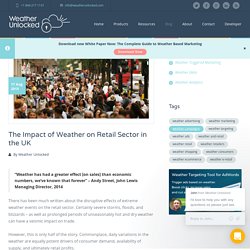
Certainly severe storms, floods, and blizzards – as well as prolonged periods of unseasonably hot and dry weather can have a seismic impact on trade. However, this is only half of the story. Commonplace, daily variations in the weather are equally potent drivers of consumer demand, availability of supply, and ultimately retail profits. As such, retailers can benefit greatly from weather based advertising, using a tool such as WeatherAds. In the USA for example, 1/3 of all business activity has some form of weather sensitivity, with weather accounting for a swing factor of 3.4% of the total GDP. A seasonal temperature just 1°C higher or lower than average typically causes a 1% fluctuation in sales. The Seasonal Buying Report - How Retailers Are Now Buying - BES Blog.
This entry was posted on Friday 6th September 2013 by Jeremy.
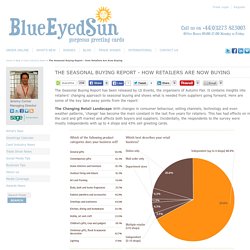
The Seasonal Buying Report has been released by i2i Events, the organisers of Autumn Fair. It contains insights into retailers' changing approach to seasonal buying and shows what is needed from suppliers going forward. Here are some of the key take away points from the report: The Changing Retail Landscape With changes in consumer behaviour, selling channels, technology and even weather patterns, 'change' has become the main constant in the last five years for retailers. This has had effects on in the card and gift market and affects both buyers and suppliers. Retailers' Changing Approach to buying Retailers are reducing their forward ordering commitment and buying closer to seasons like Christmas and Spring occasions. The importance of Christmas Christmas has become a make or break event for many retailers with a third of respondents saying that Christmas accounted for up to 50% of their annual turnover.
An Error Occurred Setting Your User Cookie. 130524 cpr pov. How retailers can fashion their way through Brexit. Ft. Luxury Daily. In the past decade the face of retail has changed course significantly with the introduction of in-store digital touch points and the advances of ecommerce.
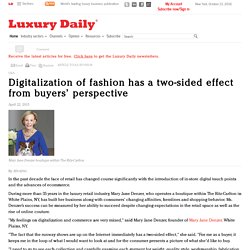
During more than 35 years in the luxury retail industry, Mary Jane Denzer, who operates a boutique within The Ritz-Carlton in White Plains, NY, has built her business along with consumers’ changing affinities, hemlines and shopping behavior. Ms. Denzer’s success can be measured by her ability to succeed despite changing expectations in the retail space as well as the rise of online couture. "My feelings on digitalization and commerce are very mixed," said Mary Jane Denzer, founder of Mary Jane Denzer, White Plains, NY. "The fact that the runway shows are up on the Internet immediately has a two-sided effect," she said. "I need to go to see each collection and carefully examine each garment for weight, quality, style, workmanship, fabrication and fit.
In this Q&A, Ms. Mary Jane Denzer with Bodhi. How Brexit may affect the British fashion industry. Ondon has been long considered one of the world’s fashion and financial capitals, as one of the world’s most creative and vibrant cities.
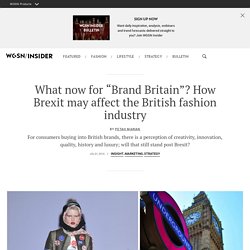
But what will the Brexit vote mean globally for “Brand Britain”? While facing reputational damage in Europe following the UK’s vote to exit the European Union, London’s perception as a cosmopolitan, multicultural hub has been dealt a second blow as the spate of racially motivated hate crimes make headlines around the world. London has garnered its reputation as a cool city because it is a place where worlds constantly collide – a city where the sari silk stores of Brick Lane rub up against the Savile Row-suited bankers of Bishopsgate. It is exciting because in a city of 8.5 million people, three million are foreign born, bringing together a diverse range of world views, to create new experiences and amazing products.
For brands trading on notions of Britishness – from Savile Row to Topshop, this once solid association is now less of a good bet. After Brexit, which way for fashion? The impact of Brexit on the fashion industry is daunting, brain-scrambling and multi-levelled.
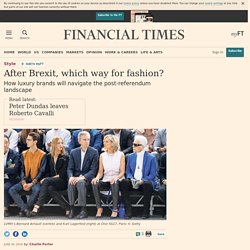
The industry directly contributed £28bn to the UK’s economy in 2015 and employs 880,000 in roles from manufacturing to retail. For many British designers and stores, there will be an immediate hit on costs and margins. Zara’s sustainable collection – great clothes that raise big questions. Recently Zara launched its new ‘Join Life’ collection – its pitch to the fast fashion lovers with an eye to the future.
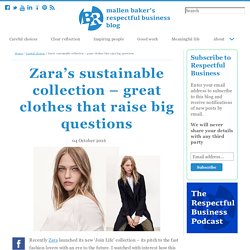
I watched with interest how this was received. The good news for the company is that the clothes have generally gotten a big thumbs up. Great write-ups for items like the new gathered waist jumpsuit, with its clean image with a burnt orange hue. Classy. What was interesting was just how many mainstream sites – sites that spend the rest of their time celebrating every aspect of the giddy helter-skelter of the fashion and beauty industries – were actually quite sniffy about the sustainability side. Like this quote from Refinery29. Because God Forbid that successful retailers should try to be more sustainable. Yes, there is an important point there, which we’ll deal with later.